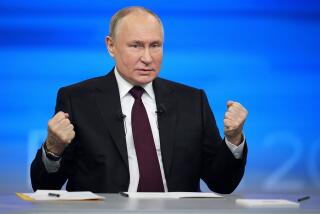Acting Russia Premier Tries to Assure West
- Share via
MOSCOW — Acting Russian Prime Minister Viktor S. Chernomyrdin sought to assure his people and the West on Saturday that Russia will not revert to Soviet-style state control to rescue its beleaguered economy from its current crisis.
With a summit meeting between presidents Bill Clinton and Boris N. Yeltsin scheduled to begin here Tuesday, Chernomyrdin said that Russia’s main goal continues to be the establishment of a market economy and a democratic society.
“We have already entered the world economy, and there will be no return to the past,” he said in a statement on nationwide television.
Chernomyrdin’s remarks were an attempt to restore calm after a tumultuous week in which the Cabinet was fired, the value of the currency plummeted and Yeltsin was compelled to go on television to deny that he was about to resign.
Dealing simultaneously with a political and a fiscal crisis, Chernomyrdin, parliamentary leaders and representatives of the Kremlin met for much of Saturday to hammer out a pact for reconstituting the government and reviving the economy.
The members of the negotiating group said they were close to agreement, but the real test will come when Yeltsin--a tenacious fighter who has long clung to power--is asked as early as today to sign a document that will force him to give up some of his authority.
According to the constitution, the Communist-dominated Duma, the lower house of parliament, must vote on whether to confirm the prime minister. Now, Duma leaders want the power to confirm or reject all Cabinet ministers before they agree to Yeltsin’s choice of Chernomyrdin. They also want Yeltsin’s guarantee that Chernomyrdin will have a free hand in selecting his Cabinet and that the president will not dismiss the government for at least a year.
*
The Communists’ goal is to obtain seats in the Cabinet for at least a handful of their members and win a greater say in government policies.
Negotiations over the power-sharing pact touched off a firestorm of controversy earlier in the week when the Communists revealed that the Kremlin was seeking a clause granting the president immunity from prosecution and financial security for his family if he was to resign.
After Yeltsin told the nation Friday night that he will not quit and that it would be “impossible” to remove him from office before his term ends in 2000, the Kremlin said its representatives would no longer seek the immunity and security provisions.
“Boris Nikolayevich [Yeltsin] does not need the Duma’s charity,” said Alexander Kotenkov, Yeltsin’s representative to the Duma.
In Moscow, the arrival of the weekend seemed to take some of the edge off the crisis mood. Angry customers no longer crowded sidewalks outside banks trying to withdraw their savings.
Russians who had earlier hoarded dollars out of fear that their currency, the ruble, would keep dropping, began buying rubles again. Some small currency exchange booths even ran out of rubles, and the currency’s value rose somewhat. In some places, it was trading as high as 9 to the dollar, compared with 12 to the dollar at some locations Friday.
But prices remained high, especially for imported goods, as some shoppers stocked up on foods that can be stored easily--just in case.
“People are buying canned meat and fish and milk in large quantities,” said Ludmila Stepanova, a grocery seller at the Vyatsky wholesale market in Moscow. “However, some people are buying pickled olives, which means things are not so bad yet.”
In his televised remarks, Chernomyrdin attempted to reassure bank depositors that they will not lose their savings, despite the seizure of one major bank and a drop of at least 40% last week in the value of the ruble.
“The main thing is to make sure people don’t suffer,” Chernomyrdin said. “For this, we should use our power, and we will use it as much as necessary. You can be calm. You will get your savings.”
*
Trying to ease tensions before the presidential summit, the acting prime minister acknowledged that “exotic formulas” offered by Communists to end the crisis were “scaring a lot of businessmen and politicians in the West.” But he said Western countries need not fear a Communist takeover.
To emphasize the point, he named three liberal officials who served in the old Cabinet--including acting Deputy Prime Minister Boris Fedorov--to form a team responsible for continuing Western-style market policies in the new government.
“We have a democratic country,” he told the German weekly Welt am Sonntag. “The Communists represent the interests of a considerable part of the population, and, representing their interests, they should influence the government. Naturally, by democratic methods.”
More to Read
Sign up for Essential California
The most important California stories and recommendations in your inbox every morning.
You may occasionally receive promotional content from the Los Angeles Times.













